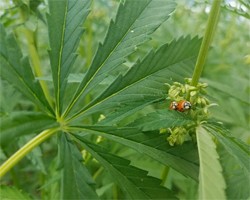Edible Hemp Foliar Sampling Project 2018
Judson Reid, Extension Vegetable Specialist, Team Leader
Harvest New York

Hemp, a multi-use crop that has been cultivated for centuries, is increasingly cultivated in New York. 'Industrial hemp' is a non-intoxicant version of Cannabis sativa with potential use as fiber, grain or processed consumer products. Hemp is a controlled substance, regulated by the US Drug Enforcement Agency. New York is one of the states with a sanctioned program to study growth, cultivation and marketing of the crop.
In 2018 CCE worked with two farms in Central and Northern New York to begin to understand nutrient dynamics in the production of edible hemp. The end product may be a microgreen for salad style consumption, juice or smoothies; or formulated into other edible products. Although we initially began to work with microgreens, farmers have found interest in edible portions of later stages of crop growth too. In both situations the crop was grown inside a greenhouse; one in mineral soil, the other in potting soil.
Foliar sampling is a common crop management tool, particularly for greenhouse and high tunnel vegetables. Coupling a soil test with regular foliar tests, farmers can observe nutrient trends within the crop and make mid-stream adjustments before deficiencies or toxicities become visible and cause a yield loss.
The data shared in this final report is an average of foliar nutrient values throughout the growing season. In this initial year of testing we observed the following trends:
- Both farms were near the lower range of sufficiency for nitrogen.
- Hemp grown in potting media tested lower in magnesium and calcium.
- The farm with mineral soil was deficient in foliar levels of phosphorus and potassium, due to low soil phosphors and potassium levels, high soil calcium and lack of fertilization.
- Both farms showed lower levels of the micronutrient manganese; likely due to high water pH/alkalinity and soil calcium levels.
Read details about the study and see charts on the macronutrients, secondary nutrients, and micronutrients in the final report found below.
Edible Hemp Foliar Sampling Project 2018 (pdf; 278KB)
Upcoming Events
Urban Ag Food Safety Webinar
March 11, 2026
12:00 pm - 1:30 pm
Urban and small-scale producers are encouraged to join us for the Urban Ag Food Safety webinar, featuring speakers from Cornell Cooperative Extension and Cornell IPM. We will explore the 'why' behind food safety, providing a basic overview and diving into specific urban ag considerations including water, pest, rodent, and soil health challenges. We will touch on the regulation and marketing landscape, and share resources for learning more. Bring your questions!Companion Planting in the Garden -- With Mushrooms!
March 12, 2026
10:00 am - 11:30 am
Learn how to diversify your garden harvest with companion planting at this virtual workshop. Plan next spring's garden with guidance CCE Harvest NY Urban Agriculture Specialist Yolanda Gonzalez on growing three different types of mushrooms.2026 Rochester Urban Agriculture Conference
March 21, 2026
9:00 am - 4:00 pm
Rochester, NY
Join us for our annual Rochester Urban Agriculture Conference, a day of learning and connections featuring interactive workshops, community knowledge sharing, Fruition's Gift of Seed Experience, horticulture tables and displays, and more!Announcements
Community Gardens Soil Testing Program Accepting Applications
Soil testing supports the growth and expansion of community gardens by protecting the health and safety of the food produced in these gardens. CCE Harvest NY, in partnership with the NYS Department of Agriculture & Markets (AGM) and the Cornell Soil Health Lab, is offering eligible, food-producing gardens in New York State the opportunity to send soil samples for testing without charge.The soil test will analyze samples for heavy metals and nutrient levels. Test results help gardeners make appropriate plans to produce high quality fruits, vegetables, and flowers. Technical support and education for participating growers will be available from the CCE Harvest New York team. Learn more about the 2026 Community Gardens Soil Testing Program.
2025 Year in Review
2025 was another year of growth and accomplishment for CCE Harvest NY! Our 2025 Year in Review highlights our impacts and details our work.- Farm to School Local Procurement by the Numbers
- Biochar in the NYC Urban Agriculture Landscape
- Harvest New York Supports Farmer-Led Research Advancing Upland Rice Production in New York State
- Community Garden Soil Testing Program Yields Great Results
- Regional Roots: Culinary Training to Enhance School Meals with Local Foods
- Rooted in Learning: Strengthening Farm to School Connections Across New York
- South Lawn Farm Expands Fresh Food Access and Urban Farming Opportunities
- NYS Summit Advances the Mushroom Industry
- Research to Manage Pests in Blueberries with Less Sprays
- Building a Research and Extension Hub at Brooklyn Botanic Garden
- A Successful Community Garden Leadership Program Pilot
- Farm to School Events Deliver Education, Culinary Training, and Business to Business Opportunities
- A Trusted Source of Science-Based Information for the Cannabis sativa Hemp Industry
- Sustainable Pest Management for New York Urban Farmers
- Cultivating Resilience: Harvest New York Drives the State's Climate Goals Through Research and Outreach
- Expanding Agritourism Outreach Across New York State
- Coordinating City Agencies, Academia, and Community Gardens to Improve Urban Soils
- USDA Urban Agriculture Training Development Complete
